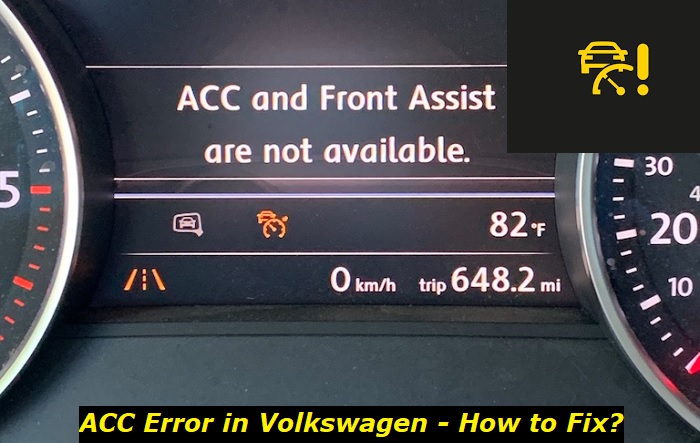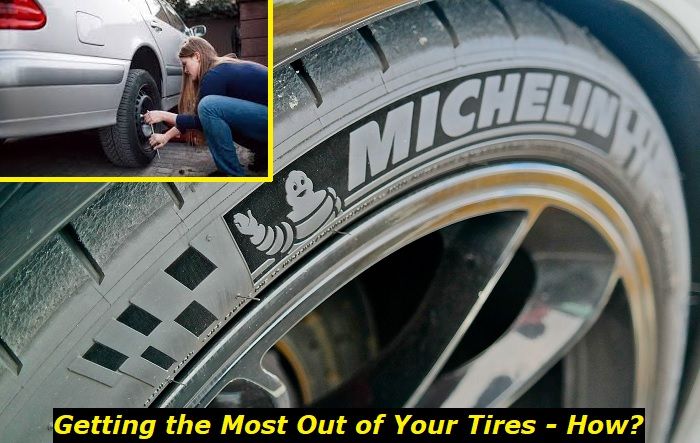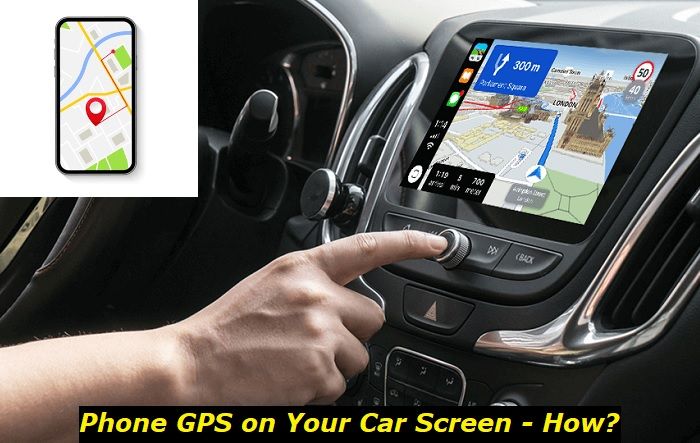ACC in a modern Volkswagen is the adaptive cruise control. This is the system that not only maintains the speed of your car on the highway but also ensures it slows down or accelerates automatically depending on the traffic conditions and also keeps the lane without you care about that much.
ACC deactivated message highlights
- Common reasons:radar sensors issues, camera problems, low voltage, bad weather
- How to fix:clean the radar and camera areas, wait for better weather, check the battery
- Possible consequences:some smart features won't be available
- Priority level:Low
- Can you drive?Yes
- DIY repair:Possible
- Repair price range:$0-$1,000

Quick overview of the ACC feature in your Volkswagen
A lot of VW models now have the adaptive cruise control feature. It allows you to not care much about keeping the line on the road - the vehicle will do this for you. Also, the sensors and radars will watch the road conditions and make sure that your car brakes whenever needed or accelerates to the set speed automatically whenever possible.
At times, this works just like autopilot. But it isn't and you should understand this. The adaptive cruise control feature relies on several sensors and sonars as well as on the majority of your car's electronic systems. It means that if something goes wrong and the signal of some of the sensors is lost, the car won't be able to control braking or acceleration.
Being aware of the problems that may come with the ACC makes your driving much safer. Unfortunately, seeing the ACC warning light on the dash of your Volkswagen is not that uncommon. This light is complex - it has the car, the cruise control symbol, and the exclamation mark in one little pictogram.
What are the components of the ACC system in your Volkswagen?
To better understand what can fail and cause the ACC error on the dash of your vehicle, you should also know what this system consists of. While I won't get too technical, I want to share with you several details about the system so that you won't be that surprised the next time you see this yellow light with a lot of small icons in it.
So, here's what the ACC system relies on:
- several sonars or radars located around the vehicle;
- multiple sensors that can sense the object on the road when it's pretty close;
- cameras - usually there are at least two cameras for front and rear;
- road sign interpreter that is a built-in function of a camera;
- standard cruise control equipment and software;
- engine sensors and actuators to control the engine output;
- ABS and braking system to be able to brake automatically;
- steering system with automatic drives;
- almost all electronic control units in your car.
The system gets information from several control units and may command them to act in a certain way. This is a pretty complex feature and it gathers a lot of information prior to making any automatic solutions about accelerating, braking, or steering your car. And while it has so many components, it's not that uncommon for this system to fail.
For the ACC to work properly, you will need all of these components to be in good condition and do their job correctly. When even one small sensor doesn't send its data to the computer, the ACC turns off to avoid collisions.
ACC light on the dash - what does this mean?
When the ACC light is on the dash of your Volkswagen, it means that the adaptive cruise control is not working at the moment. So, you need to understand that your vehicle will not automatically brake in front of the obstacle and won't keep the line by automatically steering the wheels.
There are some common reasons that you can cope with on your own:
1) The radar sensor is blocked
In this case, you may also see the corresponding message on the dash. In a lot of cars, the radar is located behind the grille and it may malfunction when some dirt gets directly on it.
2) The weather conditions are not appropriate
For example, in heavy snow, the radar may perceive snow as an obstacle, so when this happens, the system is turned off automatically. Also, this may happen in heavy fog or rain. Also, snow may clog the radar area and you will need to clean it to make the system work again.
3) Body upgrades cover the radar sensor
Another common thing is that some add-ons to your car's body could have covered the visibility area for the radar sensor. An aftermarket grille, custom license plate, or any other visual tuning in the front end of your car may cause this. Also, any front-end damage may cause this if the radar is damaged in any way.
So, in these cases, you will just need to clean the radar sensor or remove any upgrades that have been added recently. But there are also problems that you won't be able to deal with on your own.
Here they are:
1) ABS, steering system, braking system failure
If anything of these fails, your ACC will not be able to control the car. It means that it will turn off. But you will also see other lights and error messages on the dash, in this case.
2) Engine sensor problems
If engine sensors don't send the needed information about the RPM, current transmission gear, or throttle position, the ACC will not be able to control your car and will turn off. In this case, a proper inspection is needed to find out which exactly the sensor is malfunctioning.
3) Wiring or software problems
There is nothing worse than wiring or software problems in a modern car. Locating them is extremely hard and it may take you several visits to the dealership to find the roots for this problem. Even when properly inspected, the problem may not be repaired that easily.
4) Camera or other components failing
Also, the ACC may turn off when some direct components of the system are not working. This may be the radar sensor or the camera. This is the least common reason for cars that haven't been involved in road accidents with front-end damage.
What are the DIY fixes for this problem?
There are several things you can do with the problem. First of all, you can clean the radar sensor area from any dirt, insects, snow, whatever. This may help you unblock the radar and keep using the ACC system.
Secondly, there are cases when you just need to wait for better weather conditions. If this warning light came on the dash during the heavy snow, you shouldn't worry much. When the weather conditions are better, the adaptive cruise control feature will most likely work well again.
Lastly, you can remove any visual tuning elements that can cover or modify the front part of your car. Any aftermarket grille, for example, may cover the operational area of the ACC radar sensor and block the work of the entire system.
Unfortunately, when things are more serious and there is a technical issue that triggers this warning light, you will need to consult with a specialist. Dealership inspection is one of the best choices. But repairs may be completed in another place unless your car is still under warranty.
Why shouldn't you rely much on the ACC in your VW?
First of all, this is a system that relies on many sensors and radars. If only one of these components fails, the system is not reliable anymore. Volkswagen thought about that and made the ACC shut off immediately when at least something went wrong. So, you will see the "ACC Error" warning light pretty often and it won't work under many conditions.
So, relying on this system as on the autopilot is really dangerous. You should always keep your hands on the steering wheel and be ready to press the brake pedal if needed. Otherwise, your ACC may suddenly shut off and you will not have time to react. Unfortunately, trusting the ACC much has already led to several bad accidents.
Final thoughts
So, the ACC system is pretty great and allows you to have much more rest behind the steering wheel on the highway. But it's designed for perfect weather conditions and may also fail unexpectedly when something is wrong with one of the sensors or other systems. You shouldn't treat the ACC as an autopilot.
Also, there is nothing much you can do on your own but clean the radar sensor or wait till the system starts working again. All other ways to solve the problem are professional and shouldn't be carried out by people with no proper experience.
About the authors
The CarAraC research team is composed of seasoned auto mechanics and automotive industry professionals, including individuals with advanced degrees and certifications in their field. Our team members boast prestigious credentials, reflecting their extensive knowledge and skills. These qualifications include: IMI: Institute of the Motor Industry, ASE-Certified Master Automobile Technicians; Coventry University, Graduate of MA in Automotive Journalism; Politecnico di Torino, Italy, MS Automotive Engineering; Ss. Cyril and Methodius University in Skopje, Mechanical University in Skopje; TOC Automotive College; DHA Suffa University, Department of Mechanical Engineering






Add comment